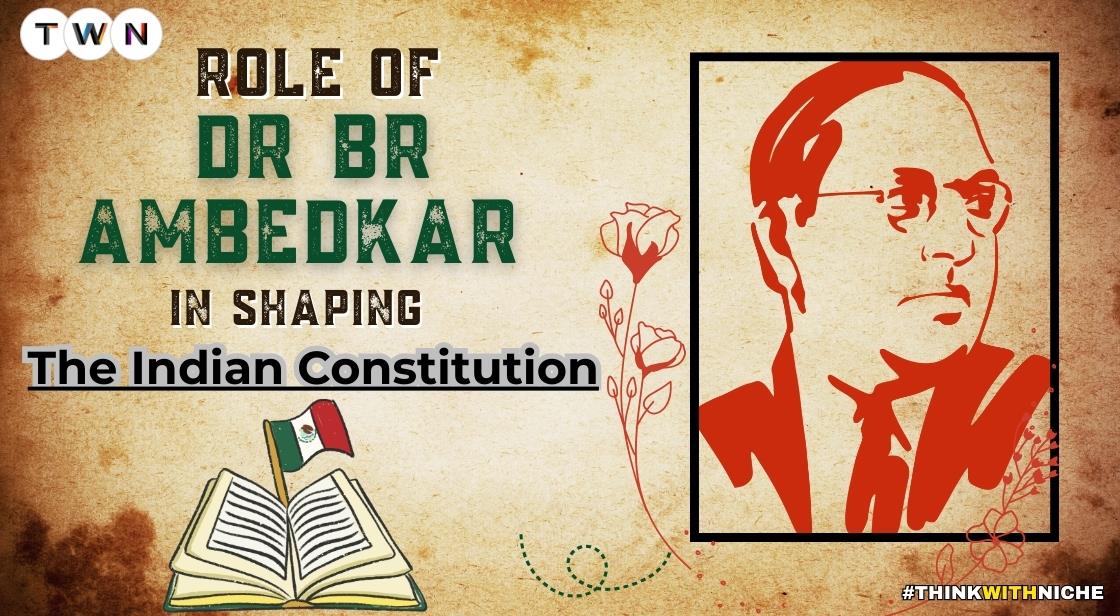Role of Dr BR Ambedkar in Shaping the Indian Constitution

Blog Post
Dr. Bhimrao Ramji Ambedkar, a visionary jurist, economist, and social reformer, played an unparalleled role in laying the democratic foundation of modern India. Widely revered as the Father of the Indian Constitution, Ambedkar’s life was dedicated to ensuring justice, equality, and dignity for every citizen, especially the marginalized.
As India celebrates Dr. B.R. Ambedkar Jayanti 2025 on April 14, we pay tribute to his extraordinary contributions to the nation. His legacy continues to inspire movements for social justice, equality, and constitutional values across India and the world.
From leading the Constitution Drafting Committee to embedding the principles of liberty, equality, and fraternity into the nation’s core, Dr. Ambedkar’s vision was both revolutionary and transformative. His commitment to building a more inclusive and democratic society remains a guiding force for generations.
This blog explores Dr. Ambedkar’s early life, his legal expertise, his pivotal role in constitution-making, and the lasting global impact of his democratic ideals. As we commemorate Ambedkar Jayanti 2025, it is a moment to reflect on how far India has come—and how much further we must go—to realize the just and equitable society he envisioned.
Why Dr BR Ambedkar Is Known as the Father of the Indian Constitution
India’s Journey to Becoming a Republic
After gaining independence from British rule on August 15, 1947, India faced the monumental task of framing a democratic system that could unify its diverse population. A Constituent Assembly was formed to draft the nation's Constitution, which came into effect on January 26, 1950 — marking the birth of the Republic of India.
Dr B.R. Ambedkar: Architect of the Constitution
Dr Bhimrao Ramji Ambedkar, a social reformer, jurist, and economist, was appointed as the Chairman of the Constitution Drafting Committee. His deep knowledge of law, dedication to social justice, and global perspective helped shape a comprehensive and inclusive Constitution for India.
The Constitution Drafting Committee: Members and Positions
The Constitution Drafting Committee was formed to draft the Constitution of India. It consisted of 7 members led by Dr. B.R. Ambedkar. Here is a list of the members along with their posts:
-
Dr. B.R. Ambedkar - Chairman (Chief Architect of the Indian Constitution)
-
Pandit Nehru - Member (First Prime Minister of India)
-
Sardar Vallabhbhai Patel - Member (First Deputy Prime Minister and Home Minister of India)
-
Maulana Abul Kalam Azad - Member (First Minister of Education of India)
-
K.M. Munshi - Member (Legal Expert and Politician)
-
M. Ananthasayanam Ayyangar - Member (Politician from the Madras Presidency)
-
T.T. Krishnamachari - Member (Indian Civil Services Officer and Politician)
The committee was responsible for drafting the Constitution of India, and its report was submitted on November 26, 1949, which was subsequently adopted and enacted on January 26, 1950.
Timeline of the Formation of the Indian Constitution
The process of drafting the Constitution of India took 2 years, 11 months, and 18 days. The Constituent Assembly first met on December 9, 1946, and the Constitution was adopted on November 26, 1949. It came into effect on January 26, 1950, marking the birth of the Republic of India.
Enduring Legacy and Historical Significance
Ambedkar’s work laid the foundation for India’s democratic values, emphasizing equality, liberty, and justice. His contributions continue to influence Indian law and society, making him a central figure in the nation’s democratic evolution.
Also Read: Understanding the Concept and Characteristics of Indian Democracy
Early Life and Legal Expertise of Dr Bhimrao Ramji Ambedkar,
Dr. Bhimrao Ramji Ambedkar was born on April 14, 1891, in Mhow (now in Madhya Pradesh) into a Dalit family. He faced severe caste-based discrimination during his childhood, which deeply impacted his worldview and later became the foundation of his lifelong fight for social justice and equality.
Pursuit of Higher Education Abroad
Ambedkar’s academic brilliance earned him a scholarship from the Maharaja of Baroda, enabling him to study abroad. He completed his M.A. and Ph.D. in Economics from Columbia University in the United States. There, he was exposed to liberal ideas, civil rights movements, and social reform discourses, which shaped his progressive vision for India.
He later studied at the London School of Economics (LSE), where he obtained a D.Sc. in Economics and also trained as a barrister at Gray’s Inn. This combination of economic, legal, and philosophical education gave Ambedkar a rare intellectual edge.
Understanding Global Legal and Democratic Systems
During his studies, Ambedkar closely analyzed global legal frameworks and democratic institutions, particularly in the U.S., U.K., and Europe. He was deeply inspired by the U.S. Constitution and the idea of civil liberties and equal rights under law.
Western Liberal Thought and Vision for India
The ideals of liberty, equality, and fraternity — foundational to Western liberal democracies — greatly influenced Ambedkar. He envisioned an India where the state guaranteed rights and dignity to every citizen, irrespective of caste, class, or creed.
Ambedkar’s Appointment as Chairman of the Drafting Committee
Context of the Constituent Assembly After Independence
After India gained independence from British rule in 1947, the country required a comprehensive constitution to govern its democratic future. The Constituent Assembly was formed in 1946 with representatives from various regions, communities, and ideologies to draft this foundational document. The task was monumental—India needed a constitution that could unify a diverse population while ensuring justice, liberty, equality, and fraternity.
Why Dr B.R. Ambedkar Was Chosen as Chairman
On August 29, 1947, the Constituent Assembly appointed Dr B.R. Ambedkar as the Chairman of the Drafting Committee. Despite being a member of the Scheduled Castes and having faced severe social discrimination, Ambedkar’s unmatched expertise in law, economics, and political science made him an ideal choice.
He was deeply familiar with global constitutions and was widely respected for his intellectual clarity, commitment to social justice, and progressive vision. His appointment reflected the Assembly's recognition of both his brilliance and his dedication to building an inclusive India.
Ambedkar’s Acceptance Speech and Vision
In his acceptance speech, Dr Ambedkar expressed both honor and caution. He acknowledged the enormous responsibility of drafting a constitution for a nation as diverse as India. He emphasized the importance of ensuring rights for all, especially the marginalized, and envisioned a future where political democracy would be complemented by social and economic equality. His vision was to craft a constitution that stood the test of time and served every Indian citizen equally.
Key Contributions of Dr. B.R. Ambedkar to the Indian Constitution
1. Fundamental Rights
Dr. B.R. Ambedkar was a staunch advocate for individual liberty and justice. As the principal architect of the Indian Constitution, he ensured that Fundamental Rights formed the backbone of democratic India. These rights guarantee freedom of speech, religion, expression, and equality before the law to all citizens. Ambedkar was particularly focused on safeguarding the rights of minorities and marginalized communities, emphasizing legal protection against discrimination and exploitation.
2. Directive Principles of State Policy
Ambedkar introduced the Directive Principles of State Policy as non-justiciable guidelines for the government to establish a welfare state. These principles reflect the socialist and humanist vision of governance, urging the state to reduce inequality, ensure fair distribution of wealth, and provide opportunities for all. Ambedkar believed that economic justice was as essential as political liberty, and the state had a moral obligation to uplift the disadvantaged.
3. Abolition of Untouchability and Caste Discrimination
A lifelong crusader against the caste system, Ambedkar played a critical role in abolishing untouchability, which was codified in Article 17 of the Constitution. This article made untouchability a punishable offense and laid the foundation for a more inclusive society. Furthermore, Ambedkar was instrumental in implementing reservation policies in education, employment, and political representation to empower Scheduled Castes and Scheduled Tribes.
4. Federal Structure with a Strong Centre
Ambedkar envisioned a federal system where power was distributed between the Centre and the states. However, given India’s diversity and potential threats to unity, he supported a strong central government to maintain law, order, and national integrity. At the same time, he ensured that states had enough autonomy to function independently on local issues.
5. Gender Equality and Social Justice
Dr. Ambedkar strongly advocated for gender equality in laws related to marriage, inheritance, and civil rights. He championed the Uniform Civil Code and emphasized that social justice must extend beyond caste to include gender rights, ensuring equality for women in all spheres of life.
Ambedkar’s Vision of Democracy
Democracy as a Way of Life
Dr. B.R. Ambedkar believed that democracy was more than just a political system or method of governance. For him, democracy represented a moral and social ideal that should shape the daily lives of citizens. He envisioned democracy as a way of life that promoted dignity, respect, and participation for every individual, regardless of caste, class, gender, or religion.
He argued that political democracy—where citizens have the right to vote and elect their leaders—must be supported by social and economic democracy. Without equality in society and economy, the true spirit of democracy cannot be realized.
Liberty, Equality, and Fraternity
Ambedkar’s concept of democracy was rooted in three fundamental principles: liberty, equality, and fraternity. Inspired by the French Revolution, he believed these were essential to maintaining a democratic society.
-
Liberty ensures freedom of thought, expression, belief, and action.
-
Equality eliminates discrimination and guarantees equal status and opportunity.
-
Fraternity promotes a sense of brotherhood and mutual respect, essential for unity in a diverse nation like India.
Ambedkar insisted that these principles must guide not only the laws of the land but also the attitudes and behavior of the people.
Democratic Ideals in His Words
Ambedkar often emphasized the need for social justice and unity. In his final speech to the Constituent Assembly, he warned:
“We must make our political democracy a social democracy as well. Political democracy cannot last unless there lies at the base of it social democracy.”.
Challenges Faced During Constitution Drafting
While drafting the Indian Constitution, Dr. B.R. Ambedkar faced intense debates and opposition from various sections of the Constituent Assembly. Issues such as reservation for Scheduled Castes and Scheduled Tribes, minority rights, and the role of religion in the state were especially contentious. Some members feared that providing special provisions for marginalized communities could divide the nation, while others saw it as a necessary corrective measure for centuries of oppression.
There was also considerable disagreement over the Uniform Civil Code, language policy, and the extent of central power. Religious and linguistic groups demanded protections for their unique identities, which made consensus-building a complex task.
Ambedkar’s Negotiation and Leadership Skills
Amid these challenges, Dr. Ambedkar displayed remarkable patience and diplomatic skill. He often engaged in calm, reasoned arguments, backing his proposals with logic and international examples. His commitment to democratic dialogue allowed him to earn the respect of even his critics.
Ambedkar also emphasized constitutional morality—urging fellow members to think beyond personal or communal interests and work towards a just and inclusive nation. Despite ideological opposition from various groups, he maintained his stance on social justice, ensuring that the Constitution guaranteed equality and dignity for all citizens.
Legacy and Recognition of Dr. B.R. Ambedkar
Long-Term Impact on Indian Legal and Political System
Dr. B.R. Ambedkar’s influence on India’s legal and democratic framework remains foundational. As the chief architect of the Constitution, his principles laid the groundwork for a sovereign, secular, and inclusive republic. His vision of justice extended beyond legal texts — he embedded mechanisms for social upliftment, especially for Scheduled Castes and Tribes, through reservation policies and anti-discrimination laws. These measures have transformed India’s governance, ensuring marginalized voices are heard in politics, education, and employment.
Posthumous Honors and National Commemorations
In recognition of his monumental contributions, Dr. Ambedkar was posthumously awarded India’s highest civilian honor, the Bharat Ratna, in 1990. His birthday, April 14, is celebrated nationwide as Ambedkar Jayanti, a public holiday and a day of tribute to his work. Numerous statues and memorials — including the grand Statue of Equality in Maharashtra — commemorate his legacy across India. Institutions like Dr. B.R. Ambedkar University and numerous public landmarks are named in his honor, reflecting his enduring national significance.
Global Recognition as a Human Rights Icon
Dr. Ambedkar’s advocacy for equality, liberty, and fraternity has garnered international respect. His efforts to eradicate caste-based discrimination are acknowledged in global human rights discourse. Organizations and scholars worldwide view him as a symbol of social justice and civil rights. Monuments and events in countries like the UK, USA, and Japan further reflect his global legacy, placing him among the world’s most revered reformers.
You May Like
EDITOR’S CHOICE












